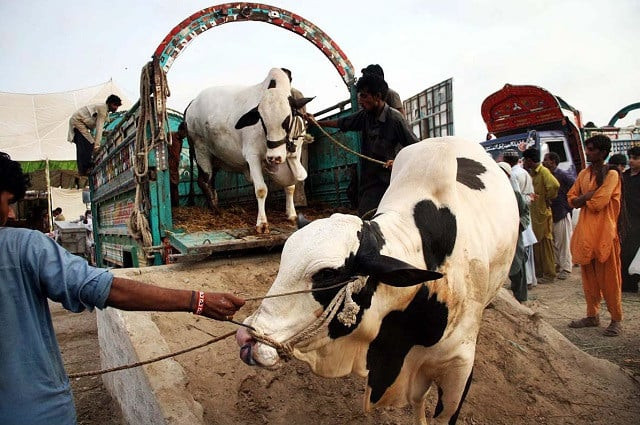Qurbani becomes hard to afford as inflation takes toll
Market survey reveals that sacrificial animal prices have surged unilaterally in most cattle markets of the port city

As Eidul Azha nears, millions of Pakistanis have found themselves gripped by troubles of rising inflation and a national power crisis, which has thrown a damper on the country’s celebratory spirit. In the capital of Sindh, citizens complain that the economic crunch has stifled their buying power, putting many things including Eid essentials beyond their reach.
According to Muhammad Shakeel, who is a member of a local mosque committee, people who could not afford buying their own sacrificial animal have always had the option of combined sacrifice, offered by mosques and various welfare organisations, to fulfil their religious commandments. In such an arrangement, up to seven people can contribute towards the purchase, upkeep and slaughter of a sacrificial animal, which is a more economical option in comparison to each person sacrificing a single animal. “However, inflation has reached such an extent in the port city, that many people for the first time, may not even be able to afford the cheapest option of collective sacrifice,” he said, adding that compared to last year, the cost of collective sacrifice has gone up by at least Rs3,000 to Rs5,000 per share this year.
A market survey reveals that sacrificial animal prices have surged unilaterally in most cattle markets of the port city, where sellers citing inflation have set their rates unbelievably high in the first few weeks. “An small sized cow that would cost around Rs70,000 last year, is now priced upwards of Rs100,000. This has also affected the cost of combined sacrifice. Currently, a single share in an animal costs between Rs10,000 to Rs20,000, whereby the Rs10,000 to Rs13,000 bracket accounts for waqf sacrifice, in which all the meat from the animal is distributed among the poor,” informed the mosque committee member.
Adding to Shakeel’s information, Asif Iqbal, who is also a mosque administrator, said that prices of combined sacrifice have been adjusted to inflation this year, which has meant a 25 to 30 per cent surge.
Other than mosques, combined sacrifice plans by welfare organisations have also become more expensive than ever before. According to Saad Edhi, who is a spokesman for the Edhi Foundation, a share in a cow now costs a minimum of Rs10,000, while a single goat costs around Rs16,000 through their organisations. Other prominent charities like Chheepa and Al Khidmat Foundation have also displayed similarly priced combined sacrifice plans where no share in any animal costs less than Rs10,000.
On the other hand, another aspect of Eidul Azha that has been hit by inflation is the price sought by professional butchers, whose rates have seen a 25 to 30 per cent increase in comparison to last year. Like the animal traders, their reason for doing so also appears to be pegged on the economic crisis and rise in petroleum prices.
Per Kamran Qureshi, who is a professional butcher, the price of slaughter depends on the size of the animal and can vary from area to area and butcher to butcher. “Professional butchers charge higher rates. Seasonal butchers can be hired for much less the price, but they are more likely to hurt the animal or ruin the meat. Currently, most good butchers are likely to charge around Rs15,000 or more for a large animal like a cow, and Rs5,000 or more for a small animal like goat or sheep,” said the butcher, adding butchering rates tend to be the highest for the first day of Eid, go down significantly for the second day, and are the cheapest on the third day.
The season of Eidul Azha usually comes as an annual boon for cargo operators and transporters who use or rent their vehicles for transporting sacrificial animals. Their prices, already steep as a seasonal business, have however seen a massive surge this year owing to the petroleum price hike. Per Furqan, who owns a small pickup truck which he seasonally uses to transport animals during Eid, transport prices usually depend on the distance, but there has been an overall surge of 30 per cent in transporter rates this year.
Published in The Express Tribune, July 6th, 2022.



















COMMENTS
Comments are moderated and generally will be posted if they are on-topic and not abusive.
For more information, please see our Comments FAQ